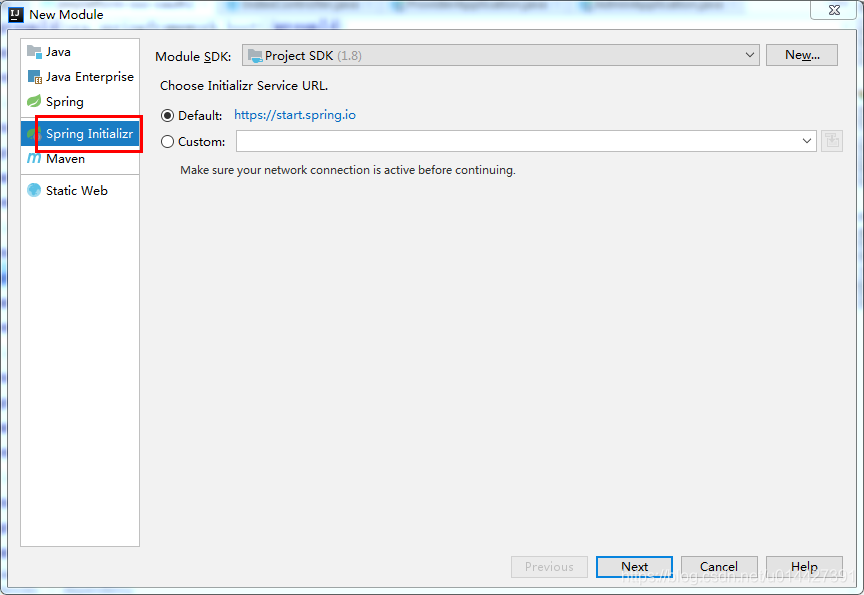OAuth2.0系列之信息Redis存储实践(七)
@
OAuth2.0系列博客:
- OAuth2.0系列之基本概念和运作流程(一)
- OAuth2.0系列之授权码模式实践教程(二)
- OAuth2.0系列之简化模式实践教程(三)
- OAuth2.0系列之密码模式实践教程(四)
- OAuth2.0系列之客户端模式实践教程(五)
- OAuth2.0系列之信息数据库存储教程(六)
- OAuth2.0系列之信息Redis存储教程(七)
- OAuth2.0系列之JWT令牌实践教程(八)
- OAuth2.0系列之集成JWT实现单点登录
1、文章前言介绍
在前面文章中我们学习了OAuth2的一些基本概念,对OAuth2有了基本的认识,也对OAuth2.0的令牌、授权码等进行了jdbc方式的数据存储,接着本文再写一遍Redis版本的
IDEA中,Ctrl+Alt+B,可以看到TokenStore的实现,有如下几种:

ok,其实对于token存储有如上方式,对于其它比如授权码code等的存储也基本如上几种,分别进行介绍:
- InMemoryTokenStore,默认存储,保存在内存
- JdbcTokenStore,access_token存储在数据库
- JwtTokenStore,JWT这种方式比较特殊,这是一种无状态方式的存储,不进行内存、数据库存储,只是JWT中携带全面的用户信息,保存在jwt中携带过去校验就可以
- RedisTokenStore,将 access_token 存到 redis 中。
- JwkTokenStore,将 access_token 保存到 JSON Web Key。
ClientDetailsService的实现只有两种,并没有redis存储的:

2、典型例子实践
实验环境准备:
- IntelliJ IDEA
- Maven3.+版本
新建SpringBoot Initializer项目,可以命名oauth2-redis-store


主要加入如下配置:
<dependency>
<groupId>org.springframework.boot</groupId>
<artifactId>spring-boot-starter-web</artifactId>
</dependency>
<!-- Spring Cloud Oauth2-->
<dependency>
<groupId>org.springframework.cloud</groupId>
<artifactId>spring-cloud-starter-oauth2</artifactId>
</dependency>
<!-- Spring Cloud Security-->
<dependency>
<groupId>org.springframework.cloud</groupId>
<artifactId>spring-cloud-starter-security</artifactId>
</dependency>
pom加入redis配置:
<dependency>
<groupId>org.springframework.boot</groupId>
<artifactId>spring-boot-starter-data-redis</artifactId>
</dependency>
redis配置:
server.port=8888
spring.redis.host=127.0.0.1
spring.redis.port=6379
spring.redis.password=
令牌存储配置:
@Autowired
RedisConnectionFactory redisConnectionFactory;
@Bean
TokenStore tokenStore() {
return new RedisTokenStore(redisConnectionFactory);
}
OAuth2.0配置类:
package com.example.springboot.oauth2.config;
import org.springframework.beans.factory.annotation.Autowired;
import org.springframework.beans.factory.annotation.Qualifier;
import org.springframework.context.annotation.Bean;
import org.springframework.context.annotation.Configuration;
import org.springframework.data.redis.connection.RedisConnectionFactory;
import org.springframework.http.HttpMethod;
import org.springframework.security.authentication.AuthenticationManager;
import org.springframework.security.oauth2.config.annotation.configurers.ClientDetailsServiceConfigurer;
import org.springframework.security.oauth2.config.annotation.web.configuration.AuthorizationServerConfigurerAdapter;
import org.springframework.security.oauth2.config.annotation.web.configuration.EnableAuthorizationServer;
import org.springframework.security.oauth2.config.annotation.web.configurers.AuthorizationServerEndpointsConfigurer;
import org.springframework.security.oauth2.config.annotation.web.configurers.AuthorizationServerSecurityConfigurer;
import org.springframework.security.oauth2.provider.token.TokenStore;
import org.springframework.security.oauth2.provider.token.store.redis.RedisTokenStore;
/**
* <pre>
* OAuth2.0配置类
* </pre>
*
* <pre>
* @author mazq
* 修改记录
* 修改后版本: 修改人: 修改日期: 2020/06/16 17:34 修改内容:
* </pre>
*/
@Configuration
@EnableAuthorizationServer
public class OAuth2Config extends AuthorizationServerConfigurerAdapter {
private static final String CLIENT_ID = "cms";
private static final String SECRET_CHAR_SEQUENCE = "{noop}secret";
private static final String SCOPE_READ = "read";
private static final String SCOPE_WRITE = "write";
private static final String TRUST = "trust";
private static final String USER ="user";
private static final String ALL = "all";
private static final int ACCESS_TOKEN_VALIDITY_SECONDS = 2*60;
private static final int FREFRESH_TOKEN_VALIDITY_SECONDS = 2*60;
// 密码模式授权模式
private static final String GRANT_TYPE_PASSWORD = "password";
//授权码模式
private static final String AUTHORIZATION_CODE = "authorization_code";
//refresh token模式
private static final String REFRESH_TOKEN = "refresh_token";
//简化授权模式
private static final String IMPLICIT = "implicit";
//指定哪些资源是需要授权验证的
private static final String RESOURCE_ID = "resource_id";
@Autowired
@Qualifier("authenticationManagerBean")
private AuthenticationManager authenticationManager;
@Autowired
RedisConnectionFactory redisConnectionFactory;
@Override
public void configure(ClientDetailsServiceConfigurer clients) throws Exception {
clients
// 使用内存存储
.inMemory()
//标记客户端id
.withClient(CLIENT_ID)
//客户端安全码
.secret(SECRET_CHAR_SEQUENCE)
//为true 直接自动授权成功返回code
.autoApprove(true)
.redirectUris("http://127.0.0.1:8084/cms/login") //重定向uri
//允许授权范围
.scopes(ALL)
//token 时间秒
.accessTokenValiditySeconds(ACCESS_TOKEN_VALIDITY_SECONDS)
//刷新token 时间 秒
.refreshTokenValiditySeconds(FREFRESH_TOKEN_VALIDITY_SECONDS)
//允许授权类型
.authorizedGrantTypes(GRANT_TYPE_PASSWORD , AUTHORIZATION_CODE , REFRESH_TOKEN , IMPLICIT);
}
@Override
public void configure(AuthorizationServerEndpointsConfigurer endpoints) throws Exception {
endpoints.tokenStore(tokenStore()).authenticationManager(authenticationManager)
//支持获取token方式
.allowedTokenEndpointRequestMethods(HttpMethod.GET, HttpMethod.POST,HttpMethod.PUT,HttpMethod.DELETE,HttpMethod.OPTIONS)
//刷新token
.reuseRefreshTokens(true);
}
/**
* 认证服务器的安全配置
* @param security
* @throws Exception
*/
@Override
public void configure(AuthorizationServerSecurityConfigurer security) throws Exception {
security
// 开启/oauth/token_key验证端口认证权限访问
.tokenKeyAccess("isAuthenticated()")
// 开启/oauth/check_token验证端口认证权限访问
.checkTokenAccess("isAuthenticated()")
//允许表单认证 在授权码模式下会导致无法根据code获取token
.allowFormAuthenticationForClients();
}
@Bean
TokenStore tokenStore() {
return new RedisTokenStore(redisConnectionFactory);
}
}
SpringSecurity配置:
package com.example.springboot.oauth2.config;
import org.springframework.context.annotation.Bean;
import org.springframework.context.annotation.Configuration;
import org.springframework.core.annotation.Order;
import org.springframework.security.authentication.AuthenticationManager;
import org.springframework.security.config.annotation.authentication.builders.AuthenticationManagerBuilder;
import org.springframework.security.config.annotation.web.builders.HttpSecurity;
import org.springframework.security.config.annotation.web.builders.WebSecurity;
import org.springframework.security.config.annotation.web.configuration.EnableWebSecurity;
import org.springframework.security.config.annotation.web.configuration.WebSecurityConfigurerAdapter;
/**
* <pre>
* Spring Security配置类
* </pre>
*
* <pre>
* @author mazq
* 修改记录
* 修改后版本: 修改人: 修改日期: 2020/06/15 10:39 修改内容:
* </pre>
*/
@Configuration
@EnableWebSecurity
@Order(1)
public class SecurityConfig extends WebSecurityConfigurerAdapter {
@Bean
@Override
public AuthenticationManager authenticationManagerBean() throws Exception {
return super.authenticationManagerBean();
}
@Override
protected void configure(AuthenticationManagerBuilder auth) throws Exception { //auth.inMemoryAuthentication()
auth.inMemoryAuthentication()
.withUser("nicky")
.password("{noop}123")
.roles("admin");
}
@Override
public void configure(WebSecurity web) throws Exception {
//解决静态资源被拦截的问题
web.ignoring().antMatchers("/asserts/**");
web.ignoring().antMatchers("/favicon.ico");
}
@Override
protected void configure(HttpSecurity http) throws Exception {
http // 配置登录页并允许访问
.formLogin().permitAll()
// 配置Basic登录
//.and().httpBasic()
// 配置登出页面
.and().logout().logoutUrl("/logout").logoutSuccessUrl("/")
.and().authorizeRequests().antMatchers("/oauth/**", "/login/**", "/logout/**").permitAll()
// 其余所有请求全部需要鉴权认证
.anyRequest().authenticated()
// 关闭跨域保护;
.and().csrf().disable();
}
}
3、功能简单测试
访问授权链接,在浏览器访问就可以,授权码模式response_type参数传code:
http://localhost:8888/oauth/authorize?client_id=cms&client_secret=secret&response_type=code
因为没登录,所以会返回SpringSecurity的默认登录页面,具体代码是 http .formLogin().permitAll();,如果要弹窗登录的,可以配置http.httpBasic();,这种配置是没有登录页面的,自定义登录页面可以这样配置http.formLogin().loginPage("/login").permitAll()
如图,输入SpringSecurity配置的数据库密码

登录成功,返回redirect_uri,拿到授权码
重定向回redirect_uri,http://localhost:8084/cms/login?code=???
配置一下请求头的授权参数,用Basic Auth方式,username即client_id,password即client_secret

拿到授权码之后去获取token,本教程使用授权码方式


例子代码下载:code download



